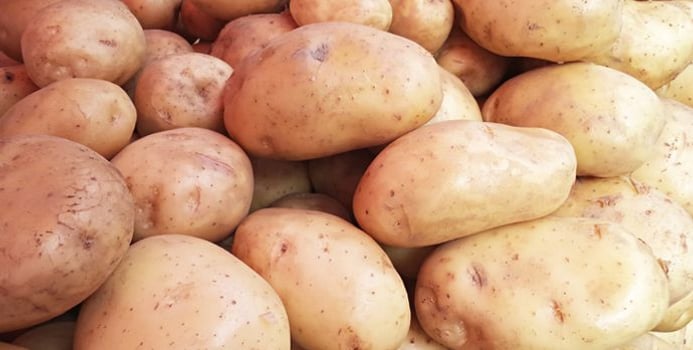You have probably been bombarded with the advice to strictly avoid all white foods. For the most part, when people say white foods are bad for you, they are referring to foods that are white and are heavily processed and refined — think anything made from white flour or white sugar. The notion that all white foods are detrimental to your health started floating around when low-carb diets such at the Atkins diet gained popularity.
White foods made from refined grains and white sugar, such as white pasta, white bread, regular flour tortillas, white rice, crackers, cookies, pastries, and all those sweets and treats (especially in what we drink) are providing too many calories and not enough healthy nutrients our bodies need. In America, calories from beverages alone make up 22 percent of our total daily caloric intake, with the majority of those calories coming from sugar-sweetened drinks.
However, carbohydrates, found in many white foods, are crucial to your health and should not be avoided altogether. In fact, carbohydrates are your body’s preferred fuel source. However, it would benefit your health to choose the right carbohydrates. White fruits and vegetables are loaded with beneficial nutrients that provide sustained energy and can help prevent disease.
Cauliflower
Cauliflower is riding a wave of popularity lately, and rightfully so. People are “ricing” cauliflower (just grate a whole head with a box grater or pulse in a food processor) and using it as a lower carbohydrate, more nutrient-dense substitute for white rice. You can also use cauliflower rice to make a flourless, high-fiber pizza crust. Cauliflower is delicious roasted (toss it with olive oil, herbs, spices, a pinch of salt, and roast at 420 degrees Fahrenheit for about 20 minutes). One cup (100 grams) of raw cauliflower contains a mere 25 calories, 0 grams of fat, 5 grams of carbohydrates, 3 grams of fiber, 2 grams of protein, 20 percent of the Daily Value for vitamin K, and a whopping 77 percent of the Daily Value for vitamin C.
Radishes
Although they’re often pink, red, or purple on the outside, the majority of the flesh of a radish is white. These spicy specimens can be enjoyed sliced in a salad or slaw but they take on a whole new depth of delicious flavor when roasted. One cup of sliced radishes contains only 19 calories, 0 grams of fat, 4 grams of carbohydrate, 2 grams of fiber, 1 gram of protein as well as 29 percent of the Daily Value for vitamin C.
Bananas
Bananas are like nature’s candy — naturally sweet, delicious, and loaded with beneficial nutrients. Chop them up and add them to oatmeal or yogurt, or pair them with peanut butter for a well-balanced snack. One medium banana (118 grams) contains 105 calories, 0 grams of fat, 27 grams carbohydrate, 3 grams of fiber, 1 gram of protein, 22 percent of the Daily Value for vitamin B6, 17 percent of the Daily Value for vitamin C, 16 percent of the Daily Value for manganese, and 12 percent of the Daily Value for potassium.
The Onion Family (Alliums)
Alliums, which include onions, garlic, leeks, shallots, scallions, chives, and the less common ramps and scapes, add a bounty of sweet, pungent, earthy flavor to your dishes, not to mention they’re incredibly nutritious. These beautiful bulbs have been correlated with a reduced risk of colon cancer and breast cancer, possibly due to their sulfide content or their high number of antioxidants, including vitamin C and quercetin.
Mushrooms
These fabulous fungi are the only plant source of vitamin D, and they’re also a good source of several B vitamins and copper. More impressive is their ability to contribute tremendous umami (savory, meaty, gravy-like) flavor to your favorite dishes. One cup of sliced white mushrooms (70 grams) contains only 15 calories, 0 grams of fat, 2 grams of carbohydrate, 1 gram of fiber, and 2 grams of protein.
White Beans
If you were to ask this dietitian what nature’s most perfect food is, I might have to say beans. They’re incredibly nutrient-dense (high in protein, fiber, iron and other minerals), super affordable, more environmentally friendly than an equal serving size of animal protein, and they’re exceptionally versatile. A 1/2 cup serving of cooked white beans provides about 150 calories, 1 gram of fat, 28 grams of carbohydrate, 7 grams of fiber, and 10 grams of protein, along with a host of vitamins and minerals.
Potatoes
Potatoes can have an undeserved bad reputation, likely because Americans typically like to eat them deep-fried or slathered with butter, cheese, and sour cream, and they skip the most nutritious part — the skin! One medium baked potato (173 grams, flesh and skin) provides 161 calories, 0 grams of fat, 37 grams of carbohydrate, 4 grams of fiber, 4 grams of protein, 28 percent of the Daily Value for vitamin C, 10 percent of the Daily Value for iron, 27 percent of the Daily Value for vitamin B6, 26 percent of the Daily Value for potassium, and is a good source of niacin, folate, magnesium, phosphorus, copper, and manganese. Turnips, parsnips, and rutabagas — in the same family as potatoes--have a similar nutrition profile. Dig into these root veggies!
[Image via Getty]



